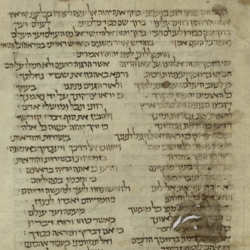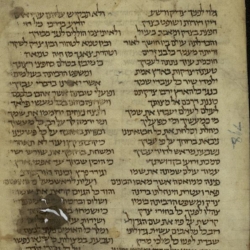Note: “The CAUSE” is used to translate the Divine Name YHVH, based on the philosophical idea of God as the Prime Mover and on the interpretation of the Name as a causative form of the copula – “causes to be.” This translation also uses the plural pronouns They/Their/Them to refer to God as a pluralis majestatis, and to avoid the implications of God being assigned a gender. (Find Ibn Ezra’s commentary on Genesis 1:1 for a discussion of the pluralis majestatis when referring to God.) All divine referents (pronouns, epithets, names) are rendered in unicase.
| Source (Hebrew) | Translation (English) |
|---|---|
בְּחֹדֶ֗שׁ אִיָּר֮ בִּשְׁנַ֪יִם בַּ֫חֹדֶ֥שׁ רָאִ֣יתִי בַּ֭מַּרְאָה וְכׇל־נְבוּאָ֑יו וְהִתְפַּלַּ֗לְתִּי לִפְנֵ֥י יְ֝הֹוָ֗ה וְאָמַרְתִּֽי׃ |
In the month of Iyar on the second of the month I looked into the sight and all Their prophecies, and I prayed before the Cause and said: |
יְהִ֨י רַחֲמֶ֬יךָ[1] רחמך כתיב יְהֹוָ֗ה אֱלֹהֵ֮ינוּ֮ עַל־צֹא֪ן הַ֫הֲרִיגָ֥ה אֲשֶׁ֣ר הֲרָג֣וּהָ רוֹעִ֑ים וְלֹא־חָמְל֥וּ עֲלֵיהֶֽם׃ |
May Your compassion, Cause our God, be upon the flock of the killing, who the shephards killed without mercy upon them. |
חֲבֹ֣שׁ בְּ֭רַחֲמֶֽיךָ[2] ברחמך כתיב עֲצָמ֣וֹת דַּכּ֑וֹת וּרְפָ֥א בְּאַהֲבָ֖ה אֶת־שִׁבְרֵ֣י נַחֲלָתֶֽךָ׃ |
Bind in Your compassion broken bones, and heal in love Your inheritance’s fractures. |
כִּ֤י לְט֣וֹב הָ֭עוֹלָם הֶעֱמַדְתַּ֣נִי לְפָנֶי֑ךָ וּלְא֥וֹר הַ֝גּוֹיִ֗ם נְתַתָּ֥נִי בְּעֻזֶּֽךָ׃ |
Since for the good of the universe You stood me before You, and to be a light to the nations You set me in Your strength. |
כׇּל־הָאֻמִּ֣ים יְסַפְּר֣וּ כְבוֹדֶ֑ךָ כִּ֤י יִרְא֣וּ צִ֝דְקָתְךָ֗ עַל־יַ֥ד נֶאֱמָנֶֽךָ׃ |
All the peoples wil tell Your glory, for they will see Your righteousness by the hand of Your faithful. |
יִקְבְּצ֣וּ סְ֭גָנִים[3] סגונים כתיב וְכׇל־מַ֣לְכֵי אָ֑רֶץ רוֹזְנֵ֥י תֵּבֵ֖ל וּמוֹשְׁלֵ֣י אָדָֽם׃ |
Officials and all the kings of the earth will gather, princes of the land and rulers of humanity, |
לִרְא֣וֹת אַתְּ־גְּבוּר֣וֹת יְמִינֶ֑ךָ וּלְהָבִ֤ין אֶת־ס֣וֹף דִּבְרֵ֣י קׇדְשֶֽׁךָ׃ |
To see the mighty acts of Your right hand, and to understand the end of Your holy words |
וְיָדְע֣וּ כֻּלָּ֣ם אֶת־גְּבוּרָתֶ֑ךָ כִּ֤י יָדְךָ֣ יְ֝הֹוָ֗ה עֹשֶׂ֥ה כׇל־אֵֽלֶּה׃ |
And they all will know Your might, for the hand of the Cause does all this. |
יִשְׂמַ֣ח צַ֭דִּיק כִּ֣י יִ֣רְאֶה זֹ֑את וְיָגִ֥יל לְ֝פָנֶ֗יךָ בְּשִׁיר֣וֹת וְהוֹדָאֽוֹת׃ |
The righteous will rejoice in seeing this, and celebrate before You[4] The layout of this verse in the manuscript does not follow the parallelism of the syntax. This is reflected in the translation. in songs and thanksgiving. |
יִלְמְד֣וּ מִ֭מֶּֽנִּי כׇּל־יוֹשְׁבֵ֣י תֵּבֵ֑ל וְיָשׁ֥וּבוּ אֶל־דַּ֝רְכְּךָ֗ וְיַעַבְד֥וּךְ בֶּאֱמוּנָֽה׃ |
All the land’s inhabitants will learn from me, and return to Your path and serve You in faith. |
וִיקַדְּמ֣וּ פָּנֶ֣יךָ בְּתוֹדָ֣ה בִּ֝זְמִיר֗וֹת וּבְשִׁיר֥וֹת וְהוֹדָאֽוֹת׃ |
And they wll greet Your presence in thanks, in hymns and in songs and thanksgiving. |
יִגְדְּל֣וּ כְּ֭בוֹדְךָ בְּת֣וֹךְ מַחֲנוֹתָ֑ם וְיָדְע֗וּ כִּי־אַתָּ֣ה יְ֝הֹוָ֗ה בְּרָאתָֽם׃ |
They will magnify Your glory in their camps, and will know that You the Cause created them. |
וְיֵב֣וֹשׁוּ כׇּל־ע֣וֹבְדֵי סֵ֑מֶל כִּ֖י יְחַכְּמ֣וּ בִּפְסִילֵֽיהֶם׃ |
All icon-worshippers will be ashamed for they thought themselves wise in their idols. |
לֹא־יַעַבְד֣וּ ע֭וֹד אֶת־אֱלִילִ֑ים וְלֹ֤א יִשְׁתַּחֲו֣וּ לָ֝עַ֗ד לְמַעֲשֵׂ֥ה יְדֵיהֶֽם׃ |
And they will no longer worship godlings, nor any longer prostrate to the work of their hands. |
וְהָאֱלִילִ֣ים כָּלִ֣יל יַחֲלֹ֑פוּ מַ֝חְמַדֵּיהֶ֗ם יֹאבְד֥וּ לָנֶֽצַח׃ |
And the godlings will all pass away, their cherished things lost for infinity |
וְתִתְגַּדֵּ֬ל וְתִתְקַדֵּ֗שׁ מִפִּ֖י כׇּל־מַעֲשֶׂ֑יךָ[5] מעשך כתיב מֵעַתָּ֥ה וְעַד־עוֹלָֽם: |
And You will be magnified and sanctified in the mouth of all Your deeds, from now and forevermore. |
כִּ֣י עַ֭בְדְּךָ יְסַפֵּ֣ר מִנִּפְלְאוֹתֶ֑ךָ כַּאֲשֶׁ֥ר כּ֝וֹח֗וֹ וְר֥וּחַ דְּבָרָֽיו׃ |
For Your servant will tell of Your wonders, as per his power and the spirit of his words. |
כִּ֗י אֵין־לִ֭י שִׂמְחַ֣ת כׇּל־דָּבָ֑ר כִּי־אִ֣ם דְּ֝בָרֶ֗יךָ וּמַרְאֵ֣ה כְּבוֹדֶֽךָ׃ |
For I have no joy in anything but in Your word and the sight of Your glory. |
אַל־תַּסְתִּ֣יר מִ֭מֶּֽנִּי בְּרַחֲמֶ֣יךָ[6] ברחמך כתיב הָרַבִּ֑ים וְאַל־תְּ֝מִיתֵ֗נִי בַּעֲב֥וּר אַהֲבָתָֽם: |
Do not hide from me in Your great mercy, and on account of their love do not let me die. |
כִּ֣י אָ֭הַֽבְתִּי מָע֣וֹן[7] מעוין כתיב בֵּיתֶ֑ךָ מִכֹּ֖ל הֵיכְלֵ֣י מְלָכִיֽם׃ |
For I love the abode of Your house more than the palaces of kings. |
טֽוֹב־לִ֥י תוֹרַת־פִּ֑יךָ מֵאֶ֥לֶף אֲ֝לָפִ֗ים כִּכְּרֵ֥י זָהָֽב׃ |
Better for me is the Teaching of Your mouth than a million talents of gold.[8] Find Psalms 119:72 |
טֽוֹב־לִ֥י קִדּוּשׁ־דְּבָרֶ֑ךָ מִכֹּ֖ל כְּלִ֣י חֶמְדָּֽה׃ |
Better for me is the sanctification of Your word than all precious objects. |
טֽוֹב־לִי֮ מִצְוֺ֪ת רְ֫צוֹנֶ֥ךָ מִכׇּל־אֲבָנִ֣ים ט֭וֹבוֹת וּמַרְגָּלִיּ֑וֹת חֶפְצֵ֥י מְלָכִֽים׃ |
Better for me are the commandments of Your will than all gemstones and pearls, kings’ desires. |
אַשְׁרֵ֗י שֶׁיִּמְצָ֣א כָּ֭בוֹד בְּחֶפְצֵ֣י רְצוֹנֶ֑ךָ וּבַעֲבוּרְךָ֥ אֲ֝נִ֗י כֵּן־אֶשְׁאַ֥ל מִפָּנֶֽיךָ׃ |
Content is the one who finds glory in the desires of Your will, and for Your sake I will thus ask of you: |
וְזֶ֣ה חֶ֭פְצִי עַל־כׇּל־בַּקָּשׁוֹתַ֑י כִּי־אֶחְיֶ֥ה לְ֝פָנֶ֗יךָ תָּמִֽיד׃ |
This is my desire over all my requests: that I live before You always, |
וַאֲהַלֵּ֬ךְ בְּצִדְקָתְךָ֗ בְּלֹ֘א־עָוֺ֥ן וְאֶרְדֹּ֣ף[9] ואדריף כתיב בַּאֲמִתְּךָ֣ כׇּל־י֑וֹם כַּ֝אֲשֶׁ֗ר יֻשַּׁ֥ר בְּעֵינֶֽיךָ׃ |
And I walk in Your glory without iniquity, and follow[10] The layout of this verse in the manuscript does not follow the parallelism of the syntax. This is reflected in the translation. Your truth every day, as is set straight in Your eyes. |
אַל־תִּמְנַ֣ע מִ֭מֶּֽנִּי אֶת־שְׁאֵלָתִ֑י וַעֲשֵׂ֥ה בַּקָּשָׁתִ֖י כְּחֶפְצֵ֣י רְצוֹנֶֽךָ׃ |
Do not refuse my ask from me, and do my request as the desires of Your will. |
אֶעֱמֹ֣ד בָּהֶ֣ם עַד־עוֹלָ֑ם לְ֝דַעַ֗ת כׇּל־נְתִיבֵ֥י צִדְקֶֽךָ׃ |
I will stand in them forevermore, to know all the pathways of Your right. |
בָּר֣וּךְ אֵ֭ל עֹ֣שֶׂה זֹ֑את בָּ֝ר֗וּךְ פּוֹעֵ֥ל אֶת־כׇּל־אֵֽלֶּה׃ |
Blessed be God who does this, blessed be the Executor of all this. |
בָּר֗וּךְ אֲשֶׁ֣ר בָּחַ֣ר בְּעַבְדּ֑וֹ וַיְמַלֵּ֣א אוֹתִ֖י כׇּל־מִשְׁאֲל֣וֹת לִבִּֽי׃ |
Blessed be the One who chose Their servant, and fulfilled all my petitions. |
בָּ֭רוּךְ שֵׁ֣ם כְּב֣וֹד מַלְכוּת֑וֹ לְ֝עוֹלָ֗ם וָעֶֽד׃ בָּ֭רוּךְ שֵׁ֣ם כְּבוֹד֑וֹ לְ֝עוֹלָ֗ם וְעַֽד׃ |
Blessed be the name of Their glorious majesty forever and aye![11] The last two lines of this psalm are written two verses to a line instead of one. And blessed be Their glorious name forever and aye! |
בָּ֤רֽוּךְ־יְהֹוָ֨ה אֱלֹהֵ֪י יִשְׂרָאֵ֡ל מִן־הָ֤עוֹלָ֨ם ׀ וְעַ֬ד הָעוֹלָ֗ם וְאָמַ֖ר כׇּל־הָעָ֥ם אָמֵֽן׃ |
Blessed be the Cause God of Israel from eternity until eternity, and all the people said amen![12] Find Psalms 106:48 |
This is the second psalm found in MS RNL Antonin 798 in the Antonin Collection, St. Petersburg. A transcription and English translation of the work was most recently published in Has Psalm 156 Been Found? With Images of MS RNL Antonin 798 (2018) by James H. Charlesworth with the assistance of Brandon L. Allen. This vocalized and cantillated transcription and translation was made by Isaac Gantwerk Mayer. Most of the more recent scholarship considers the work to either be from the Qumran community (that produced the Dead Sea Scrolls) or from the same period and culture. Adding to his survey of scholarly opinion on the date and origin of the work, Charlesworth writes, “While I would like to affirm the hypothesis that the author of MS RNL Antonin 798 knew the Qumran Psalms Scroll, that conclusion has not been demonstrated; we can only be confident that the author of MS RNL Antonin 798 shared the same culture and time with the author or scribe of the Psalms Scroll, the Self-Glorification Hymn, and the Testament of Judah” (p. 67). –Aharon Varady
Source
Notes
| 1 | רחמך כתיב |
|---|---|
| 2 | ברחמך כתיב |
| 3 | סגונים כתיב |
| 4 | The layout of this verse in the manuscript does not follow the parallelism of the syntax. This is reflected in the translation. |
| 5 | מעשך כתיב |
| 6 | ברחמך כתיב |
| 7 | מעוין כתיב |
| 8 | Find Psalms 119:72 |
| 9 | ואדריף כתיב |
| 10 | The layout of this verse in the manuscript does not follow the parallelism of the syntax. This is reflected in the translation. |
| 11 | The last two lines of this psalm are written two verses to a line instead of one. |
| 12 | Find Psalms 106:48 |

“בְּחֹדֶשׁ אִיָּר | Second psalm of the “Additional Psalms” from the Cairo Geniza, MS RNL Antonin 798” is shared through the Open Siddur Project with a Creative Commons Attribution-ShareAlike 4.0 International copyleft license.











Comments, Corrections, and Queries